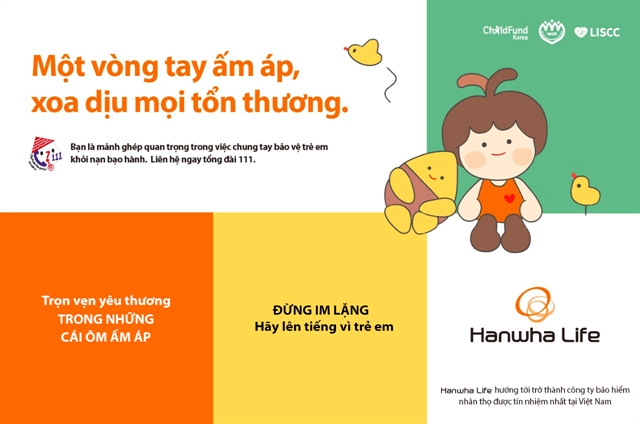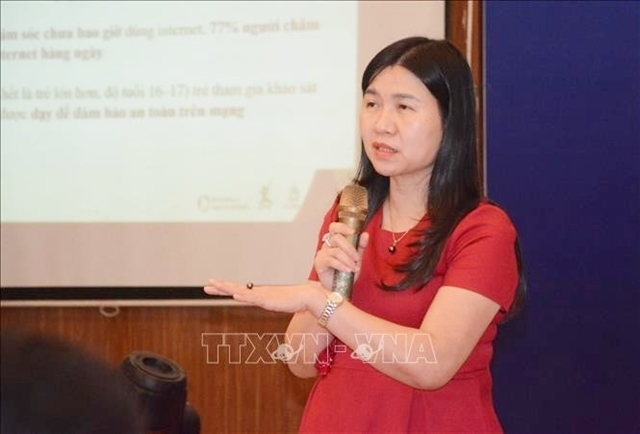 Society
Society

Nguyễn Thị Nga, deputy director of the Children's Department, Ministry of Labour, War Invalids and Social Affairs, speaks to Voice of Vietnam (VOV) about efforts to protect children’s rights.
 |
| Nguyễn Thị Nga, deputy director of the Children's Department, Ministry of Labour, War Invalids and Social Affairs. — VNA/VNS Photo |
Việt Nam is the first country in Asia and the second country in the world to ratify the United Nations Convention on the Rights of the Child. What does this mean in implementing children's rights and realising Việt Nam's commitment to the UN?
Since ratifying the UN Convention on the Rights of Children, the Party and the State have paid great attention to ensuring the implementation of children's rights in Việt Nam.
The 2013 Constitution stipulates that children are protected, cared for and educated by their families, the State and society. During economic and social development, programmes, plans and projects related to children have been all approved and directed by the Prime Minister for implementation.
Until now, the legal framework for promoting and implementing children's rights in Việt Nam has been consistent and comprehensive.
Recent child abuse and child trafficking cases stirred public outrage. What are your views on this?
Violence against children, child abuse and trafficking are global issues, not limited to Việt Nam.
Việt Nam has more than 25 million children. When we received information and notifications about incidents involving violence, abuse and child trafficking, relevant ministries, sectors, competent agencies and local authorities acted quickly, allowing us to provide support and intervention to children and their families.
We have also strictly imposed sanctions on individuals and subjects who commit acts of abuse and violence, as well as child traffickers.
The entire political system of Việt Nam has paid attention to ensuring children's rights, including preventing and combating child abuse.
According to statistics, in the United States, each year up to 3,000 children are killed by guns. And about 500 children died due to family reasons. According to a report by the United Nations Children's Fund published in 2017, every seven minutes in the world, one adolescent dies due to violence. Faced with such a situation, what measures do we have to promptly take to respond to child abuse in Việt Nam?
Since the introduction of the Children's Law, Việt Nam has established a free national children protection hotline (111) to report such occurrences.
Agencies and local authorities have prioritised child protection services to help families, children and the community.
Child protection services have received attention from relevant agencies and localities to support families, children and the community.
When events are reported, we all have policies in place to support and intervene with children and families. As a result, in recent years, the Ministry of Labour, War Invalids, and Social Affairs, as well as other ministries and sectors, have acquired and analysed data pertaining to occurrences of violence and child abuse via various channels.
Việt Nam has also made many efforts and solutions to promote and ensure the implementation of children's rights.
Recently, there have been incidents of religious leaders calling on children to protest and oppose the government. When children are taken advantage of like this, how will it affect their psychology? What measures must be taken to protect children, prevent exploitation of children and use of children in political activities?
Children have four groups of rights. First, they have the right to survive.
The second is the development rights, especially the rights to study, play, and entertain.
The third is the right to be protected from violence, abuse, and exploitation. And the fourth is that children have the right to express their opinions and aspirations.
The fact that some subjects take advantage of and lure children to participate in illegal acts is behaviour that needs to be condemned and strictly handled following laws. Taking advantage of and using children for political motives is a violation of the law, according to the Vietnamese legal system.
When the Action Month For Children was launched, some people posted articles with the title "Việt Nam needs a revolution in children's rights". They commented that "Vietnamese children are not respected and do not know anything about their rights". Do you have any comments on that?
Since we had the provisions of the 2013 Constitution, the Children's Law has a chapter regulating children's participation in issues related to children.
We specifically stipulate the scope and form of children's participation, and the responsibilities of families, schools, agencies and organisations in ensuring children's right to participate.
In Việt Nam, every 10 years we launch a National Action Programme for Children. To solve hot issues related to children, Government leaders have also approved and issued the National Action Plan on preventing and combating violence and child abuse; and programmes to prevent and reduce child labour against the law, and child injury prevention programme.
Efforts to promote children's rights in Việt Nam are always a priority.
What do we need to do to best ensure children's rights?
We are always determined to build a safe, friendly and healthy living environment for all children. In addition to the responsibility of the State, the role of the family is very important.
Parents and family members need to have the knowledge and skills to protect their children, in their best interests, to ensure children's basic rights as citizens such as health care rights, the right to play, entertain and participate in activities that are truly safe, to avoid acts of taking advantage of, seducing and luring children to participate in illegal activities. VNS




